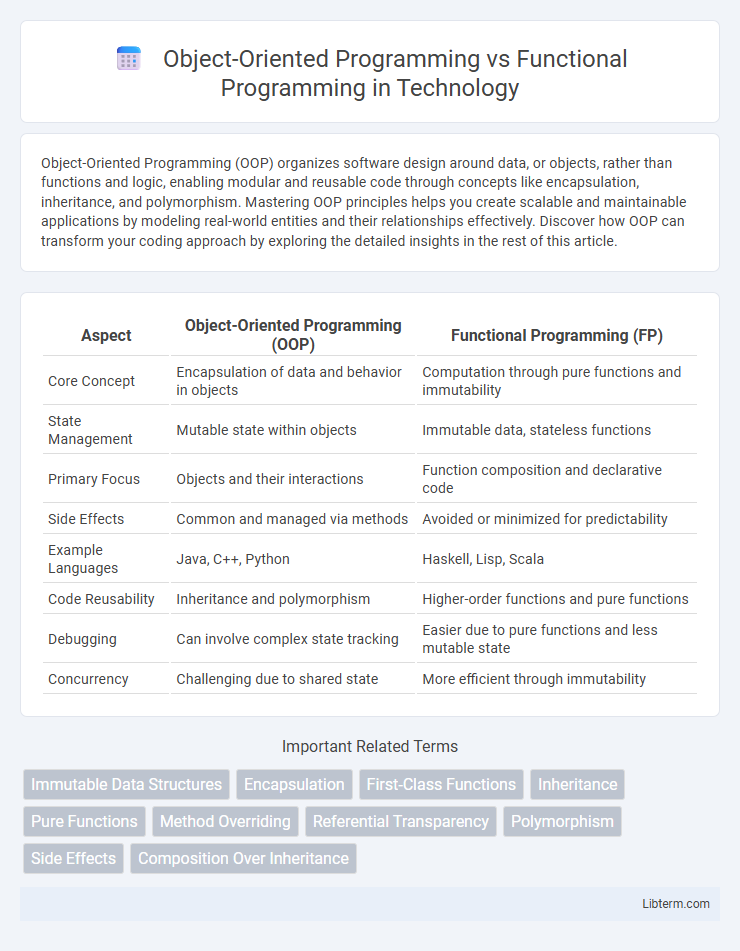Object-Oriented Programming (OOP) organizes software design around data, or objects, rather than functions and logic, enabling modular and reusable code through concepts like encapsulation, inheritance, and polymorphism. Mastering OOP principles helps you create scalable and maintainable applications by modeling real-world entities and their relationships effectively. Discover how OOP can transform your coding approach by exploring the detailed insights in the rest of this article.
Table of Comparison
| Aspect | Object-Oriented Programming (OOP) | Functional Programming (FP) |
|---|---|---|
| Core Concept | Encapsulation of data and behavior in objects | Computation through pure functions and immutability |
| State Management | Mutable state within objects | Immutable data, stateless functions |
| Primary Focus | Objects and their interactions | Function composition and declarative code |
| Side Effects | Common and managed via methods | Avoided or minimized for predictability |
| Example Languages | Java, C++, Python | Haskell, Lisp, Scala |
| Code Reusability | Inheritance and polymorphism | Higher-order functions and pure functions |
| Debugging | Can involve complex state tracking | Easier due to pure functions and less mutable state |
| Concurrency | Challenging due to shared state | More efficient through immutability |
Introduction to Programming Paradigms
Object-Oriented Programming (OOP) organizes software design around data objects and their interactions, emphasizing encapsulation, inheritance, and polymorphism to model real-world entities. Functional Programming (FP) treats computation as the evaluation of mathematical functions, prioritizing immutability, first-class functions, and statelessness to promote predictable and maintainable code. Understanding these paradigms is essential for selecting the most effective approach in software development projects, balancing complexity, scalability, and code clarity.
What is Object-Oriented Programming?
Object-Oriented Programming (OOP) is a programming paradigm centered around objects, which combine data and behavior through classes and instances. Key concepts include encapsulation, inheritance, and polymorphism, allowing developers to model real-world entities and relationships effectively. OOP languages such as Java, C++, and Python enable modular, reusable, and maintainable code by organizing software design around objects.
What is Functional Programming?
Functional programming is a programming paradigm that treats computation as the evaluation of mathematical functions, emphasizing immutability and statelessness. It avoids changing state and mutable data, promoting pure functions that produce consistent outputs for the same inputs. Key features include first-class and higher-order functions, recursion, and the use of expressions rather than statements for flow control.
Key Principles of OOP
Object-Oriented Programming (OOP) is centered around key principles such as encapsulation, inheritance, polymorphism, and abstraction, which enable modular, reusable, and maintainable code structures. Encapsulation bundles data and methods within classes, restricting direct access and promoting data integrity, while inheritance allows new classes to derive properties and behaviors from existing ones. Polymorphism supports method overriding and interface implementation, facilitating dynamic behavior, and abstraction hides complex implementation details from users, focusing on essential features.
Core Concepts in Functional Programming
Functional programming centers on pure functions, immutability, and first-class functions to create predictable and testable code. Key concepts include higher-order functions that take or return other functions, and recursion as a primary looping mechanism instead of mutable state. This paradigm emphasizes declarative code structure, avoiding side effects and ensuring functions produce the same output given the same input.
Code Structure: OOP vs Functional
Object-Oriented Programming (OOP) structures code around objects that encapsulate both data and behavior, promoting modularity through classes and inheritance. Functional Programming emphasizes pure functions and immutable data, encouraging code organization via function composition and higher-order functions. This leads to OOP code with tightly coupled state and behavior, while Functional code remains stateless and promotes easier reasoning about program flow.
State Management and Immutability
Object-Oriented Programming (OOP) manages state through mutable objects that encapsulate data and behavior, allowing state changes via methods. Functional Programming (FP) emphasizes immutability by avoiding shared state and side effects, using pure functions that return new data structures instead of modifying existing ones. This immutability in FP enhances predictability and concurrency, while OOP's mutable state can simplify modeling complex, interactive systems.
Reusability and Modularity
Object-Oriented Programming (OOP) enhances reusability and modularity through encapsulating data and behavior within classes and objects, allowing developers to create reusable components and extend functionality via inheritance and polymorphism. Functional Programming (FP) promotes modularity by emphasizing pure functions and immutability, which facilitate code reuse through higher-order functions and function composition while reducing side effects. Both paradigms improve software maintainability, but OOP excels in modeling complex stateful systems, whereas FP is preferred for stateless, mathematical computations.
Performance and Scalability Considerations
Object-Oriented Programming (OOP) often incurs overhead due to dynamic dispatch and mutable state, which can impact performance in highly concurrent environments. Functional Programming (FP) leverages immutability and stateless functions, enabling easier parallelism and improved scalability on multi-core systems. Benchmark analyses reveal FP languages like Haskell and Scala outperform in distributed computing scenarios, while OOP excels in complex state management and legacy system integration.
Choosing the Right Paradigm
Choosing the right programming paradigm depends on the project requirements, team expertise, and problem domain. Object-Oriented Programming (OOP) excels in scenarios requiring clear modular structures, encapsulation, and reusable code through classes and objects. Functional Programming (FP) is ideal for applications that benefit from immutability, statelessness, and higher-order functions, improving concurrency and reducing side effects.
Object-Oriented Programming Infographic

 libterm.com
libterm.com